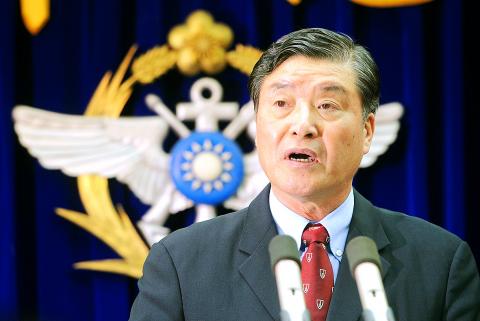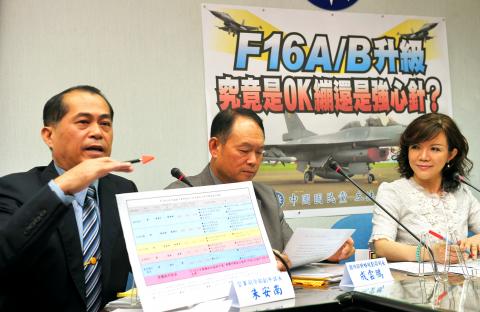The government has thanked the US for agreeing to help upgrade the air force’s F-16A/B fleet, saying it was an indication of the US taking concrete action to implement the Taiwan Relations Act.
At a press conference called late on Wednesday night, Minister of Foreign Affairs Timothy Yang (楊進添) hailed the administration of US President Barack Obama for “responding to our request proactively by taking concrete actions to approve” the upgrade.
The US government formally notified Congress on Wednesday of its intent to sell Taipei military equipment and services worth about US$5.85 billion. The package includes upgrades of Taiwan’s F-16A/Bs, along with pilot training and spare parts, but does not include new F-16C/Ds that Taipei had wanted to modernize its arsenal.

Photo: Liu Hsin-de, Taipei Times
Yang said that together with a previous arms sale worth US$12.5 billion, which the US offered Taiwan less than three years into President Ma Ying-jeou’s (馬英九) presidency, the US government has provided US$18.3 billion worth of weapons to Taiwan “on an unprecedented scale and pace.”
Ma yesterday also showed his thanks and reiterated his calls for the US to sell F-16C/Ds and other defensive weapons to Taiwan.
He stressed that buying weapons from the US does not signal any intention to engage in an arms race with China, but that it is necessary to maintain Taiwan’s defensive capabilities.

Photo: CNA
Ma added that these arms procurements were much larger than any under his two predecessors, former presidents Lee Teng-hui (李登輝) and Chen Shui-bian (陳水扁).
“The upgrade package will make the air force of the Republic of China the first fleet in the world equipped with AESA radars, which can effectively deal with [China’s] J-20s,” according to Chu An-nan (朱安南), deputy chief of the Air Force Headquarters.
However, polarized responses emanated from governing and opposition lawmakers.
Chinese Nationalist Party (KMT) Legislator Lin Yu-fang (林郁方) said that while the exclusion of F-16C/Ds from the package could bring to mind the phrase, “if you can’t have a fish, a shrimp can be just as good,” he said that he did not think the retrofit package was a shrimp. “It was a fish. In fact, a very big fish.”
Lin said he was “deeply moved” by the F-16A/B retrofit package because it was “far better than I had expected,” which he said showed the Obama administration “highly recognized” Ma’s efforts to pursue cross-strait peace and enhance Taiwan’s self-defense capability.
However, the Democratic Progressive Party (DPP) said the Ministry of National Defense and the Ministry of Foreign Affairs’ efforts to describe the US arms sale of F-16A/B upgrades as an “achievement” was regretful and contradictory.
“We don’t understand why the two ministries expressed gratitude when Taiwan came up short of its wish for F-16C/Ds procurement,” DPP spokesperson Kang Yu-cheng (康裕成) said, noting that Deputy Minister of National Defense Andrew Yang (楊念祖) in May explained to US officials why Taiwan desperately needs the F-16C/D and yet, on Wednesday night, he said the offered package was not a bad deal and he was not disappointed at all.
DPP Legislator Huang Wei-cher (黃偉哲) said the defense ministry was being contradictory when it said the upgraded F-16A/Bs would be better than the F-16C/Ds, yet at the same time said that it planned to push for the F-16C/D procurement.
DPP spokesperson Chen Chi-mai (陳其邁) said a number of US lawmakers expressed anger at the White House’s refusal to sell new jets to Taiwan and accused Obama of bowing to Chinese pressure, and yet “the defense ministry brags” about arms procurement and “describes it as an achievement.”
In Beijing, China’s Foreign Ministry condemned the sale as undermining overall ties and military exchanges. Chinese Vice Minister of Foreign Affairs Zhang Zhijun (張志軍) summoned US Ambassador Gary Locke in Beijing to complain. China’s Minister of Defense warned the US had “created severe obstacles for normal military-to-military exchanges between the two countries.”
The strong words are seen as rhetoric catering to the military and nationalistic public, who regard the US as an interloper that uses support for Taiwan as a means of restraining China’s rise, according to some observers.
Additional Reporting By CNA and AP

DAREDEVIL: Honnold said it had always been a dream of his to climb Taipei 101, while a Netflix producer said the skyscraper was ‘a real icon of this country’ US climber Alex Honnold yesterday took on Taiwan’s tallest building, becoming the first person to scale Taipei 101 without a rope, harness or safety net. Hundreds of spectators gathered at the base of the 101-story skyscraper to watch Honnold, 40, embark on his daredevil feat, which was also broadcast live on Netflix. Dressed in a red T-shirt and yellow custom-made climbing shoes, Honnold swiftly moved up the southeast face of the glass and steel building. At one point, he stepped onto a platform midway up to wave down at fans and onlookers who were taking photos. People watching from inside

A Vietnamese migrant worker yesterday won NT$12 million (US$379,627) on a Lunar New Year scratch card in Kaohsiung as part of Taiwan Lottery Co’s (台灣彩券) “NT$12 Million Grand Fortune” (1200萬大吉利) game. The man was the first top-prize winner of the new game launched on Jan. 6 to mark the Lunar New Year. Three Vietnamese migrant workers visited a Taiwan Lottery shop on Xinyue Street in Kaohsiung’s Gangshan District (崗山), a store representative said. The player bought multiple tickets and, after winning nothing, held the final lottery ticket in one hand and rubbed the store’s statue of the Maitreya Buddha’s belly with the other,

‘NATO-PLUS’: ‘Our strategic partners in the Indo-Pacific are facing increasing aggression by the Chinese Communist Party,’ US Representative Rob Wittman said The US House of Representatives on Monday released its version of the Consolidated Appropriations Act, which includes US$1.15 billion to support security cooperation with Taiwan. The omnibus act, covering US$1.2 trillion of spending, allocates US$1 billion for the Taiwan Security Cooperation Initiative, as well as US$150 million for the replacement of defense articles and reimbursement of defense services provided to Taiwan. The fund allocations were based on the US National Defense Authorization Act for fiscal 2026 that was passed by the US Congress last month and authorized up to US$1 billion to the US Defense Security Cooperation Agency in support of the

‘COMMITTED TO DETERRENCE’: Washington would stand by its allies, but it can only help as much as countries help themselves, Raymond Greene said The US is committed to deterrence in the first island chain, but it should not bear the burden alone, as “freedom is not free,” American Institute in Taiwan Director Raymond Greene said in a speech at the Institute for National Defense and Security Research’s “Strengthening Resilience: Defense as the Engine of Development” seminar in Taipei yesterday. In the speech, titled “Investing Together and a Secure and Prosperous Future,” Greene highlighted the contributions of US President Donald Trump’s administration to Taiwan’s defense efforts, including the establishment of supply chains for drones and autonomous systems, offers of security assistance and the expansion of